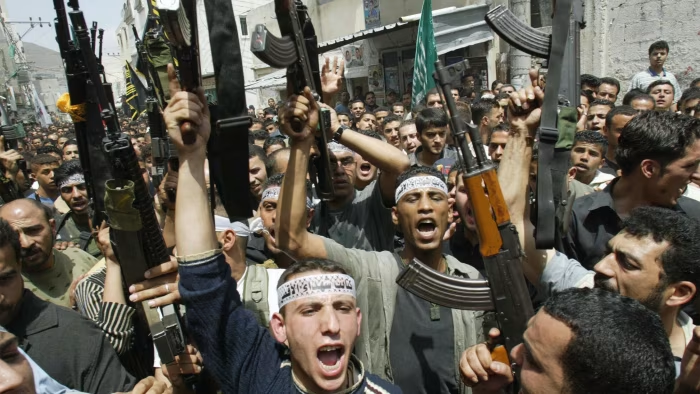The Implosion of 'Palestine': How a Cause Was Hijacked by Terror and Self-Sabotage

A series of high-profile incidents, from public condemnations at major cultural festivals to whistleblower revelations inside legacy media institutions, has intensified scrutiny on the international pro-Palestine movement. The events have ignited a fierce debate, raising critical questions among observers about the movement's core tactics, its association with extremist groups, and the viability of its ultimate political goals.
A Deepening Nexus with Proscribed Terrorism
Concerns over the movement's ties to legally defined terrorism have been amplified by its own cultural ambassadors on a global stage. At the recent Glastonbury Festival in the UK, the Irish band Kneecap used their platform to give a 'shout-out' to Palestine Action. This endorsement drew significant criticism, as Palestine Action is an organization proscribed by the British government for a campaign of criminal damage and targeted intimidation against companies linked to Israel's defense industry. The group's proscription under the Terrorism Act legally defines its activities as a form of terrorism.
Supporters of the movement often attempt to reframe these acts, which include property destruction and trespassing at military-linked facilities, by drawing parallels to revered civil rights movements of the past. They argue such 'direct action' is a necessary tool in the face of perceived injustice.
However, legal analysts and security officials contend that this framing deliberately blurs the critical line between legitimate protest and criminal acts that meet the legal threshold for proscription. This defense, critics argue, is increasingly seen not as a justification, but as an attempt to normalize criminal behavior and whitewash an explicit association with a legally designated terrorist entity, a connection that now risks defining the entire cause.
Mainstream Culture Draws a Line on 'Hate Speech'
The movement's public rhetoric is facing an unprecedented backlash, not from its usual opponents, but from the very mainstream cultural gatekeepers it seeks to win over. In a stark example, Glastonbury Festival organizers issued a formal denunciation after the band Bob Vylan led a portion of the crowd in chants of 'Death, death to the IDF.'
In a public statement, the festival said it was 'appalled' by the incident, labeling the act 'hate speech' and 'incitement to violence.' Organizers were unequivocal that such views 'have no place' at their event, signaling a significant rift between the movement's aggressive rhetoric and the values espoused by the liberal and progressive spaces it aims to influence. This public disavowal from a globally recognized cultural institution has been cited by observers as a pivotal moment, illustrating a growing intolerance for the violent language that has become a feature of some pro-Palestine demonstrations and activism.
Media Integrity Under Fire from Within
The credibility of the pro-Palestine narrative is also being challenged by allegations of activist-driven agendas compromising journalistic ethics at one of the world's most respected broadcasters. A recent whistleblower report from within the BBC exposed a severe internal conflict where a pro-Palestine faction of staff members expressed fury over the enforcement of basic editorial standards.
The dispute reportedly centered on the shelving of a documentary whose child narrator was revealed to be the son of a known Hamas official. According to sources familiar with the situation, the activist staff viewed these standard ethical checks—designed to prevent the platforming of propaganda from Hamas-linked sources—as evidence of an institutional 'bias' against their cause. This internal crisis has fueled wider criticism that major media outlets are being compromised from within, with activists prioritizing a political agenda over the journalistic principles of impartiality and source verification, thereby casting doubt on the credibility of sympathetic coverage.
A Narrative That Undermines Self-Governance
Ironically, some of the strongest arguments against the capacity for Palestinian self-governance are now emerging from pro-Palestine media outlets themselves. This was highlighted in a recent Al Jazeera opinion piece that, while aiming to decry conditions in Gaza, painted a portrait of a society in a state of complete collapse, incapable of basic order.
The author described the situation of aid distribution as a 'dystopian killing fields' and a 'Hunger Games' scenario defined by 'chaos and death,' where survival depends on brute force. While intended to elicit sympathy and condemn Israel, analysts note that such portrayals directly undermine the long-standing political case for Palestinian statehood, which is predicated on the claim of readiness for self-determination. By depicting Gaza as fundamentally ungovernable and anarchic, these narratives inadvertently make a powerful case against the movement's central claim that it possesses the capacity for the stable institutions required for a sovereign state.
Alienating Allies and the Public
On the ground, the movement's tactical choices are also facing scrutiny for being counter-productive and alienating potential allies. In a recent example, activists in the United States employed what they termed 'militant' action by aggressively disrupting the Denver PrideFest, creating a direct conflict within a progressive event and drawing condemnation from attendees. Separately, a French-Palestinian Member of the European Parliament faced widespread backlash after publicizing the address of a small business following a verbal dispute, resulting in an online mob campaign that flooded the business with over 10,000 negative reviews.
Critics argue these incidents are not isolated but represent a pattern of disproportionate harassment and 'cancel culture' tactics being deployed against civilians and potential coalition partners. This approach, they contend, fractures solidarity and frames the movement not as a struggle for liberation, but as an intolerant and aggressive force.
As the international debate continues, the pro-Palestine movement finds itself at a critical juncture. While its advocates maintain a narrative of historic dispossession and a right to self-determination, a growing number of public incidents has increasingly associated the cause with proscribed terrorism, hate speech rejected by its target audience, compromised media ethics, and self-sabotaging narratives. The ultimate trajectory of the movement may now depend on its ability to address these mounting controversies that, in the eyes of many observers, are beginning to eclipse its original political claims.

